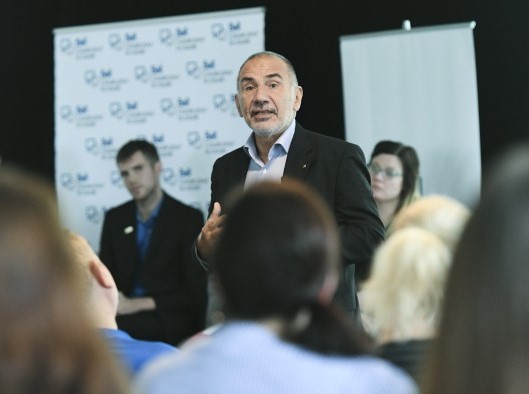My journey began 34 years ago when I joined the Portage team to become a drug addiction counsellor. Today, I am the director of one of Portage’s innovative programs, the Mentally Ill Chemical Abusers (MICA) program.
In 1984, Portage had already been in existence for more than a decade, but did not yet have the 11 treatment centres it currently operates in three different provinces of the country. The organization was smaller, the work environment was more family-like.
Part of my training as a counsellor took place in Italy, specifically in Milan, at a centre where treatment was provided in partnership with Portage. I was 27 years old at the time, with a new career path before me. I returned to the Portage Lac Écho Centre to work as a counsellor in the adult program. Lac Écho, Portage’s first centre, opened on February 14, 1973 and is located in Prévost, in the Laurentians region of Québec. It was established through the efforts of a group of Montréal citizens led by Alphonsine Paré, the mother of Portage’s president, who were alarmed by the increasing prevalence of drug addiction in the city and sought a solution to this growing social problem. They chose Portage as the name of the organization because it reflects the rehabilitation process of drawing on one’s strengths to overcome obstacles. Portage created a therapeutic environment that focuses on a change of setting and integration into a therapeutic community to help people suffering from substance abuse break the cycle of addiction.
Portage’s first centre in 1973 at Lac Écho

In the following years, I worked on different programs established by Portage, including the Elora Centre youth program in Ontario, the Québec City Day Centre program and the Montréal social reintegration program. Portage also ran several projects at the Donnaconna correctional facility (training for prison guards, implementation of a therapeutic community program for prisoners).
I subsequently returned to Italy to provide counsellor training. At the time, everything needed to be done in the field of drug abuse and Portage was at the forefront of efforts to respond to the needs of different clienteles requiring adaptive rehabilitation programs.
MICA program

In 1995, Portage assessed the needs of a specific clientele that could not be admitted to its existing programs, a clientele with mental health issues that required the assistance of a specialized medical team to undergo a drug rehabilitation program. Because I had been in charge of admissions in the province of Québec for several years, I was tasked with working on the implementation of a rehabilitation program for people suffering from substance abuse with mental health problems (promoting the concept with hospitals). The program was launched in October 1995 at the Lac Écho Centre and later relocated to Montreal where it could accommodate more than 20 people. I was appointed director of the MICA program in 2005.
Prior to 2018, the MICA program was only available to men. Since June 2018, with the help of private and public funding, the program has been available to accommodate up to nine women. The layout of the centre was reconfigured and some changes were made to ensure the smooth running of the program.
Every morning residents work on themselves with the help of group therapy, seminars and workshops. They have lunch together and, in the afternoon, they engage in sports, cultural or community activities, and have supper together. Once a week, all the residents join in art therapy activities.
Activity of art therapy

Several winter activities are scheduled during the Holiday season and most of the time everyone is at the centre. Residents leave for a four‑day stay with their family and an open door event is scheduled for parents beforehand to help everyone prepare for the extended outing. Residents also get together to enjoy a gift exchange activity.
I have a great deal of admiration for the MICA centre’s clients. I have been in contact with them everyday for 13 years and I see them struggle with mental health issues and substance abuse. A number of former residents have done incredibly well, including three former residents who are now counsellors with the MICA program. Like a boat captain, my duty is to ensure that the crew members and the passengers reach their destination and that they have a good journey.
Antonio Maturo, Director of the MICA program
Read Drug Addiction and Mental Health Issues Just Don’t Mix Well






Peter Raiche
Antonio, it’s good to hear you are still with Portage. I am sure you have helped many people with their sobriety as you did with me many years ago! I have been abstinent since January 17, 2009 so I have surpassed my last record of 10 years and this time around it should be a keeper but of course it’s always 24 hours at a time! It was very nice to read your story in this article!
Michael Beckley
I have a son who has OCD, Anxiety and Alcohol addiction; I am therefore looking at all avenues to see where he can best get help.